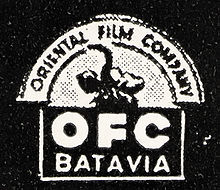Oriental Film

Oriental logo, from an advertisement for Panggilan Darah
|
|

The ANIF studios, which Oriental used from late 1940 until the company closed in 1941
|
|
| Private | |
| Industry | Film |
| Founded | Batavia, Dutch East Indies (1940) |
| Defunct | 1941 (dissolved) |
| Headquarters | Batavia, Dutch East Indies |
|
Area served
|
Dutch East Indies |
|
Key people
|
|
Oriental Film was a film production company in Batavia, Dutch East Indies (now Jakarta, Indonesia). Established by ethnic Chinese businessman Tjo Seng Han in 1940, it completed four black-and-white films before it was closed in 1941. All the company's films were screened into the 1950s but may now be lost. They were directed by two men, Njoo Cheong Seng and Sutan Usman Karim, and launched the careers of actors such as Dhalia and Soerip.
Established during the revival of the Indies film industry, Oriental released its first film, Kris Mataram, in July 1940. It starred Njoo's wife Fifi Young, and relied on her fame as a stage actress to draw audiences. This was followed by a further three films, which were targeted at low-income audiences and extensively used kroncong music. Their final production was Panggilan Darah in 1941, which was completed after Njoo and Young had migrated to Majestic Film. Oriental was unable to recoup its expenses of renting a Dutch-owned studio, and the company was shut down.
Following the commercial successes of Terang Boelan (Full Moon; 1937), Fatima (1938), and Alang-Alang (Grass; 1939), the Dutch East Indies film industry – which had been severely weakened by the Great Depression – was revived. Film production increased and, in 1940, four new production houses were opened, including Oriental Film. Funded entirely by the ethnic Chinese businessman Tjo Seng Han, the company's first headquarters were at 42 Matraman Street, in eastern Batavia (now Jakarta); according to the weekly Sin Po, this studio had simple facilities. Another ethnic Chinese businessman, Tjan Hock Siong, was brought on to manage the day-to-day activities of the studio.
...
Wikipedia
